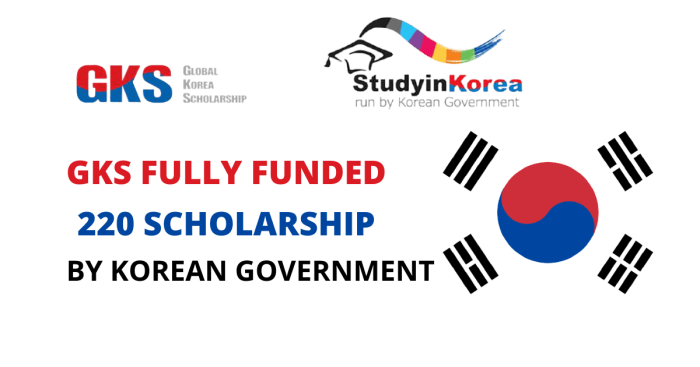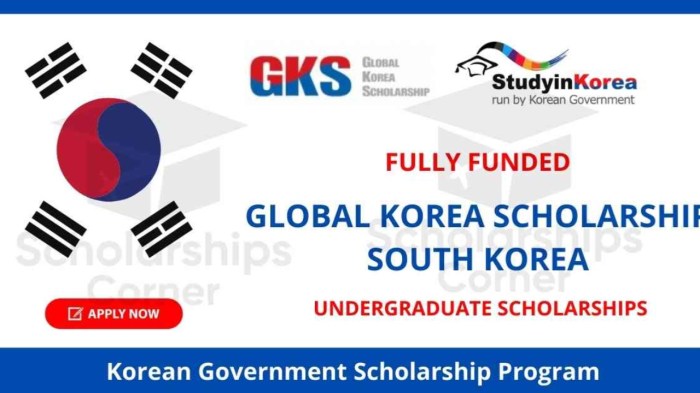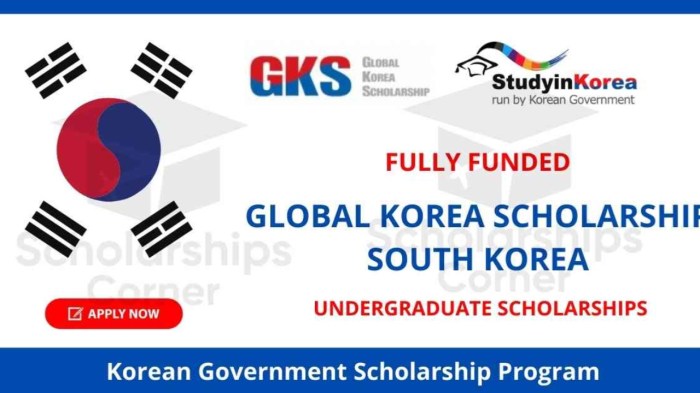Global Korean scholarships offer a remarkable opportunity for international students to pursue higher education in South Korea. These programs, funded by a variety of organizations including the government, universities, and private foundations, provide financial support ranging from tuition waivers to living stipends. Securing a scholarship opens doors to a vibrant academic environment, rich cultural immersion, and potentially lucrative career paths upon graduation. This guide will delve into the various types of scholarships available, the application process, and life as an international student in Korea.
From undergraduate to postgraduate studies, numerous scholarships cater to diverse academic pursuits. Understanding the eligibility criteria, financial aid components, and post-scholarship opportunities is crucial for a successful application. This guide aims to provide a clear and comprehensive overview, equipping prospective applicants with the necessary knowledge to navigate this exciting journey.
Types of Global Korean Scholarships
Securing funding for higher education in South Korea is a significant step for international students. Numerous scholarship opportunities exist, catering to diverse academic backgrounds and levels of study. These scholarships are offered by various organizations, each with its own specific eligibility criteria and application processes. Understanding these differences is crucial for prospective students seeking financial assistance.
Government-Sponsored Scholarships
The Korean government, through its various ministries and agencies, offers a range of scholarships to attract international students. These scholarships are often highly competitive and provide substantial financial support, including tuition waivers, living stipends, and airfare. Eligibility criteria typically involve academic merit, English language proficiency, and sometimes, specific fields of study. Examples include the Korean Government Scholarship Program (KGSP), which offers scholarships for both undergraduate and postgraduate studies across various universities in South Korea. The KGSP is known for its rigorous selection process, prioritizing applicants with exceptional academic records and leadership potential. Another example is the Global Korea Scholarship (GKS), which is also administered by the Korean government and offers a wide range of opportunities for international students.
University-Specific Scholarships
Many universities in South Korea offer their own scholarships to attract talented international students. These scholarships vary significantly in their funding amounts and eligibility requirements, depending on the university’s priorities and available resources. Some universities might prioritize students from specific countries or regions, while others may focus on particular academic disciplines. For instance, Seoul National University, a prestigious institution, offers several scholarships for international students, often based on academic excellence and research potential. These scholarships might cover tuition fees, living expenses, and sometimes research grants. Similarly, other top universities like Yonsei University and Korea University offer their own scholarship programs, with their own specific eligibility criteria and application procedures.
Private Foundation Scholarships
Several private foundations in South Korea and internationally also offer scholarships to international students pursuing studies in Korea. These scholarships often have specific focuses, such as promoting cultural exchange or supporting research in particular fields. The eligibility criteria for these scholarships can vary greatly depending on the foundation’s mission and funding priorities. Some may prioritize students from developing countries, while others may focus on specific academic disciplines or research areas. Finding these scholarships often requires diligent research and networking within relevant academic circles.
Scholarship Examples by Study Level
Numerous scholarships cater to different levels of study. Undergraduate scholarships often focus on academic merit and English proficiency, while graduate and postgraduate scholarships frequently emphasize research potential and prior academic achievements. Specific examples are difficult to provide without knowing the exact year of application, as deadlines and offerings change annually. However, many of the government and university scholarships mentioned above accept applications for undergraduate, graduate, and postgraduate students.
Eligibility Criteria and Application Deadlines
Eligibility criteria and application deadlines vary significantly across different scholarship programs. It is essential to check the specific requirements of each scholarship program carefully. Generally, requirements include academic transcripts, letters of recommendation, English language proficiency test scores (TOEFL, IELTS, etc.), and a statement of purpose. Some scholarships may also require specific standardized test scores (like the GRE or GMAT for graduate programs). Deadlines typically fall within the late fall or early winter for the following academic year.
| Scholarship Name | Sponsor | Eligibility | Application Deadline (Example – Varies Annually) |
|---|---|---|---|
| Korean Government Scholarship Program (KGSP) | Korean Government | Academic excellence, English proficiency, specific field of study (varies) | Late Fall/Early Winter |
| Global Korea Scholarship (GKS) | Korean Government | Academic excellence, English proficiency, specific field of study (varies) | Late Fall/Early Winter |
| Seoul National University International Scholarship | Seoul National University | Academic excellence, English proficiency, research potential | Late Fall/Early Winter |
| [Private Foundation Scholarship Example] | [Private Foundation Name] | [Specific Eligibility Criteria – Varies] | [Application Deadline – Varies] |
Application Procedures and Requirements
Securing a Global Korean Scholarship requires careful planning and meticulous execution. The application process is competitive, so understanding the procedures and meeting all requirements is crucial for success. This section details the steps involved, common pitfalls to avoid, and essential application materials.
Step-by-Step Application Guide, Global korean scholarship
The application process typically involves several key steps. First, carefully review the eligibility criteria for the specific scholarship you are applying for, as requirements may vary. Next, gather all necessary documents, ensuring they meet the specified formatting and submission guidelines. Then, complete the online application form accurately and thoroughly. Finally, submit your application before the deadline, allowing ample time to address any potential technical issues. Remember to keep copies of all submitted materials for your records. Deadlines vary by scholarship and year, so always refer to the official scholarship website for the most up-to-date information. Submission methods are usually online, often through a dedicated portal.
Common Application Mistakes and How to Avoid Them
Applicants frequently make mistakes that can hinder their chances of success. One common error is missing deadlines. Another is submitting incomplete or poorly formatted applications. Failing to accurately represent academic achievements or providing weak letters of recommendation also negatively impacts applications. To avoid these mistakes, meticulously check deadlines, carefully proofread all materials, and ensure all required documents are submitted in the correct format. Seek feedback on your application materials from trusted advisors or mentors. Starting the application process early allows ample time for revisions and addressing any unforeseen challenges.
Necessary Application Materials Checklist
A comprehensive checklist ensures you don’t overlook any crucial documents. This typically includes a completed application form, official academic transcripts, letters of recommendation (usually two or three), a personal statement outlining your academic goals and aspirations, and possibly language proficiency test scores (e.g., TOEFL, IELTS, or TOPIK). Depending on the scholarship, you might also need a copy of your passport or national ID, proof of financial need, and a research proposal (for research-based scholarships). Maintaining a detailed checklist and regularly reviewing it against your progress is highly recommended.
Importance of Strong Application Materials
Strong academic transcripts demonstrate your academic capabilities and potential. They provide concrete evidence of your past performance and serve as a foundation for evaluating your suitability for the scholarship. Letters of recommendation offer external validation of your skills, character, and potential. Strong letters come from individuals who can speak authoritatively about your abilities and suitability for the scholarship. A compelling personal statement allows you to articulate your motivations, aspirations, and how the scholarship aligns with your long-term goals. It provides a personal touch and allows the selection committee to understand your individual circumstances and ambitions. Together, these components paint a comprehensive picture of your qualifications and suitability for the scholarship.
Living and Studying in Korea: Global Korean Scholarship

Embarking on your academic journey in South Korea offers a unique blend of rigorous education and vibrant cultural immersion. Understanding the cultural nuances, visa requirements, and cost of living is crucial for a smooth and enriching experience. This section provides essential information to help you prepare for your time in Korea.
Cultural Aspects of Studying in Korea
Korean culture is characterized by a strong emphasis on respect for elders and authority figures, a collectivist mindset, and a deep appreciation for education. International students should be mindful of these cultural norms. Bowing is a common greeting, particularly when meeting professors or older individuals. Direct confrontation is generally avoided, with indirect communication often preferred. Understanding the concept of “face” (saving face) is important; actions that might cause embarrassment or loss of face should be avoided. While English is increasingly common in urban areas, learning basic Korean phrases will significantly enhance your interactions and show respect for the local culture. Furthermore, punctuality is highly valued, and showing up late for classes or meetings is considered disrespectful.
Visa Requirements and the Student Visa Process
To study in Korea, international students require a D-2 student visa. The application process typically begins with acceptance into a Korean university or educational institution. The university will then provide you with the necessary documents to apply for the visa at the nearest Korean embassy or consulate in your home country. Required documents usually include an acceptance letter from the university, proof of financial support, a passport valid for at least six months beyond your intended stay, and a completed visa application form. Processing times vary depending on the embassy and individual circumstances. It’s advisable to apply well in advance of your intended arrival date. Failure to obtain the correct visa before arriving in Korea will result in deportation.
Cost of Living in Korean Cities
The cost of living in South Korea varies considerably depending on the city. Seoul, the capital, tends to be the most expensive, while smaller cities like Gwangju offer a more affordable lifestyle. Accommodation costs are a significant factor, with options ranging from university dormitories to private apartments. Transportation costs are generally reasonable, with efficient and affordable public transportation systems available in most cities. Daily expenses, such as food and groceries, are relatively moderate, although costs can vary depending on dietary choices and lifestyle.
Cost of Living Comparison: Seoul, Busan, Daegu, and Gwangju
| City | Monthly Accommodation (USD) | Monthly Transportation (USD) | Monthly Daily Expenses (USD) |
|---|---|---|---|
| Seoul | 500 – 1500+ | 50 – 100 | 300 – 700+ |
| Busan | 400 – 1200 | 40 – 80 | 250 – 600 |
| Daegu | 350 – 1000 | 30 – 70 | 200 – 500 |
| Gwangju | 300 – 800 | 25 – 60 | 180 – 450 |
Note: These figures are estimates and can vary significantly depending on lifestyle and individual choices. These figures represent a range based on average costs reported by various sources and should be considered approximations.
Post-Scholarship Opportunities
Completing a scholarship program in Korea opens doors to a wide array of opportunities, extending far beyond academic achievement. Graduates benefit from enhanced career prospects, valuable networking connections, and potential avenues for continued learning and research within Korea or internationally.
The skills and knowledge acquired during your studies, combined with the international exposure gained while living and studying in Korea, make scholarship recipients highly competitive candidates in the global job market.
Career Paths and Job Opportunities
Korean scholarship programs often cultivate a strong emphasis on practical skills and industry relevance. This translates to a variety of career paths for graduates. Many find employment in multinational corporations with Korean branches, leveraging their Korean language proficiency and cultural understanding. Others pursue careers in fields directly related to their studies, such as engineering, technology, business, or the arts. The Korean government also actively recruits graduates for roles in public service and international cooperation. Graduates with strong research backgrounds may find opportunities in Korean universities or research institutions. The specific opportunities depend heavily on the field of study and individual skills.
Networking Opportunities and Alumni Networks
A significant advantage of participating in a Korean scholarship program is access to extensive networking opportunities. Many programs maintain active alumni networks, connecting past recipients with each other and with potential employers. These networks provide invaluable support, mentorship, and access to job opportunities. Networking events, workshops, and online platforms facilitate connections, allowing scholars to build professional relationships and gain insights into various industries. The strong emphasis on community within Korean culture further enhances these networking opportunities, fostering long-lasting connections among scholarship recipients.
Further Studies and Research Opportunities
For those seeking to further their academic pursuits, Korea offers numerous options for advanced studies and research. Many universities provide opportunities for doctoral programs, postdoctoral research, and further specialization in various fields. The high quality of Korean research institutions and the availability of research grants make Korea an attractive destination for continued academic endeavors. Furthermore, the established research collaborations between Korean universities and international institutions create opportunities for international research projects and collaborations.
Examples of Successful Alumni
While specific details of individual alumni are often kept private for confidentiality reasons, the success stories of many scholarship recipients are readily apparent through their achievements in various fields. For instance, many alumni have gone on to lead successful careers in prominent multinational corporations, contributing significantly to their respective industries. Others have become influential researchers, professors, and entrepreneurs, shaping their chosen fields and contributing to global advancements. The impact of these scholarships extends beyond individual success to influence broader societal progress.
Illustrative Examples of Successful Applicants

The following profiles illustrate the diverse backgrounds and achievements of successful applicants for Global Korean Scholarships. These examples highlight the range of academic excellence, extracurricular involvement, and compelling personal narratives that scholarship committees value. Remember, while these examples showcase successful applications, there is no single formula for success; individual strengths and experiences are key.
Successful applicants often demonstrate a strong academic record, complemented by meaningful extracurricular activities that reflect their passions and commitment. Their essays articulate a clear understanding of their academic goals, their reasons for choosing Korea, and how the scholarship will contribute to their future aspirations. Strong letters of recommendation provide external validation of their capabilities and potential.
Profiles of Successful Applicants
Below is a table detailing the diverse backgrounds and accomplishments of several successful Global Korean Scholarship recipients. Note that details have been altered to protect the privacy of the individuals involved while maintaining the essence of their profiles.
| Applicant Name | Nationality | Academic Background | Extracurricular Activities | Motivation for Applying | Essay Focus |
|---|---|---|---|---|---|
| Anya Sharma | India | GPA: 3.9/4.0, Major: Computer Science, Ranked 5th in class | President of the Computer Science Club, Volunteer at a local tech center, Published research paper on AI | Desire to pursue advanced research in AI at a top Korean university. | Focused on her passion for AI, the specific research opportunities available in Korea, and her long-term career goals. |
| David Kim | USA | GPA: 3.8/4.0, Major: Korean Literature, Dean’s List all semesters | Fluent in Korean, Member of the Korean Cultural Club, Participated in a Korean language exchange program | Deep interest in Korean culture and literature, aiming to contribute to Korean Studies scholarship. | Highlighted his fluency in Korean, his passion for Korean literature, and his specific research interests within the field. |
| Maria Rodriguez | Mexico | GPA: 3.7/4.0, Major: Business Administration, Minor in International Relations | Founder of a student-led business initiative, Volunteer work with underprivileged communities, Internship at a multinational corporation | Intention to leverage Korean business acumen to develop sustainable business practices in her home country. | Emphasized her entrepreneurial spirit, her understanding of global business dynamics, and her plan to apply Korean business models to address social issues. |
| Kenzo Tanaka | Japan | GPA: 3.95/4.0, Major: Engineering, Numerous awards for academic excellence | Captain of the Robotics Club, Participation in international robotics competitions, Published multiple research papers | Strong interest in advanced robotics and automation technologies prevalent in South Korea. | Showcased his achievements in robotics, his familiarity with Korean technological advancements, and his desire to contribute to the field. |
Pursuing a global Korean scholarship represents a significant investment in one’s future, offering invaluable academic and personal growth. By carefully considering the various scholarship options, understanding the application process, and preparing thoroughly, aspiring students can increase their chances of success. The experience of studying in Korea, enriched by cultural exchange and academic excellence, promises to be both rewarding and transformative, laying the groundwork for a successful career and enriching personal journey.
Detailed FAQs
What is the average duration of a Korean scholarship?
The duration varies depending on the program and level of study, typically ranging from one academic year to several years for postgraduate programs.
Are language proficiency requirements mandatory for all scholarships?
Yes, most scholarships require a minimum level of Korean language proficiency, although some programs may offer language support or waive this requirement under specific circumstances.
Can I apply for multiple Korean scholarships simultaneously?
Yes, you can apply for multiple scholarships, but ensure you meet the eligibility criteria for each and manage application deadlines effectively.
What are the chances of getting a Korean scholarship?
Competition is typically high. Strong academic records, compelling personal statements, and relevant experience significantly improve your chances.
Securing a global Korean scholarship can be a highly competitive process, requiring dedication and strong academic records. However, exploring alternative funding options, such as the army rotc scholarship , might offer a pathway for those interested in military service alongside their studies. Ultimately, the best scholarship route depends on individual circumstances and aspirations, but a thorough search is key to finding the right fit for pursuing higher education.
